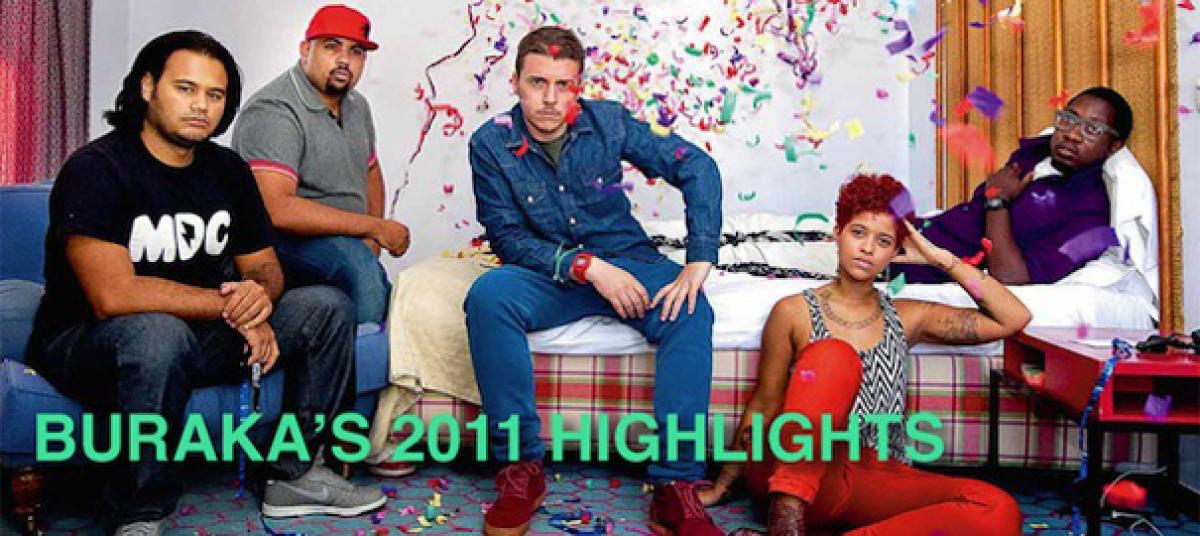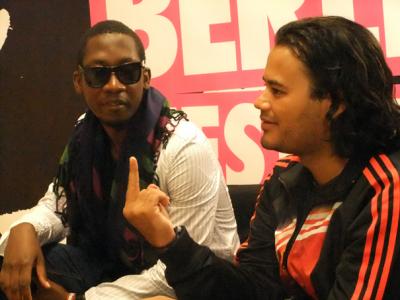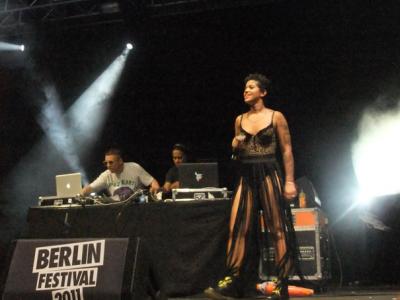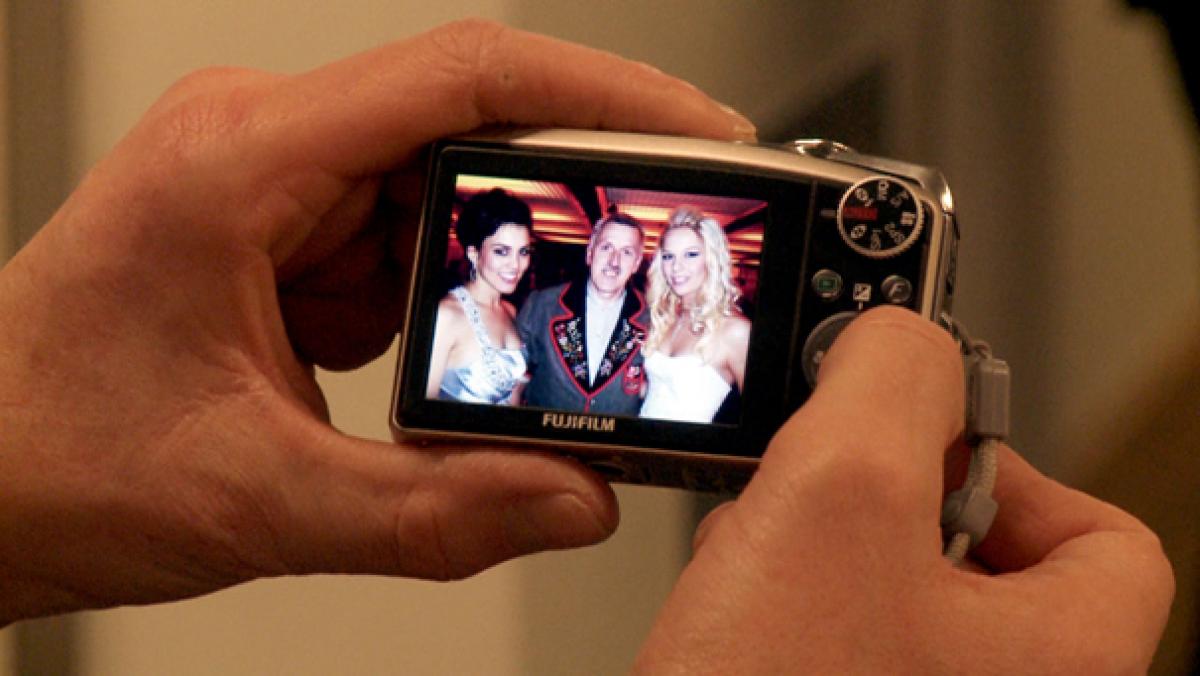
Bootlegs, Irony and Butts
Buraka Som Sistema – J-Wow (João Barbosa), DJ Riot (Rui Pité), Kalaf Ângelo, Andro Carvalho and newest member Blaya are in the world of Kuduro key players even though they are – in a way – outsiders, both geographically and sound-wise. An Interview.
By picking up where DJs and producers from Luanda move to the next beat (and dance step) and tweaking it by their own means of production, the group members of Buraka Som Sistema act as an amplifier of what is now widely known as Angolan sound. It's safe to say that for many listeners, DJs and dancers, they where the ones that literally put Kudoro on the map in the first place. Three years after the notorious M.I.A. opened their breakthrough single «Sound of Kuduro» with a hollered «one drop two drop three drop four, sound of Kuduro knocking at your door», the door lies flat on the floor, but Buraka Som Sistema are still pretty lonesome in the space they broke through to (at least within the impressive line-up of the Berlin Festival; they were the only act that combined African house-rhythms with the breaks and bass-lines of the rave and dubstep vocabulary) – or they are smack bam in the middle in the party, depending on how you look at it.
On stage we could see the band in both situations: All on their own, in a stripped down version of their stage show – if you consider two DJs and three MC/dancers as stripped down. Later they were joined by a raging crowd of mostly blond ladies that swarmed the stage shortly before the finale and even joined in in a bum-shaking choreography.
In short, it was a blast – a glimpse of their album Komba, as well as a reminder of just how many hits these people have gathered already. And when the «album material» (a term rendered senseless in iPod age) was at its end, they still had gigabytes of bootleg food in their machines. The show ended with the riff of «Sweet Child O'mine», kicked by the bouncing Kuduro beat and greeted by the audience with ample cheers and buttshaking.
Only a few hours later, Rui Pité – responsible for one half of the knob twiddling side of things - and MC Kalaf Ângelo sit down to tell a bit about the last three years of madness and some familiar misconceptions about the nature of Kuduro. Unfortunately, time was too short to actually discuss their new album «Komba» which deals with the tradition of celebrating life when facing death. Let us just say, it has just as many hits as Black Diamond and a few more features (including African Boy and Vienna's Stereotype). And it is clearly worthy of bootlegging, and definitely worth not (just) downloading.
[Eric Mandel]: Why did you stick up your middle fingers to the crowd?
[Rui]: It is for a song, it is to make a classic Portuguese gesture. Actually there is «fuck you» and «fuck you». You do it like this (makes a fist and sticks a finger out in the lame resignating whining middle European way), and we do it like this (brings his hand into a predator-like claw, middle finger sticking above 4 tensed neighbours with sexual potential. We all nod.) It's from a song with Deize Tigrona, a Brazilian funk diva and she was making fun of Brazilians coming to Portugal and how they have to come to grips with the differences in slang and vernacular. So she helped herself by referring to that special gesture. No offence intended.

[EM]: None taken. How did you get the idea of taking Kuduro and bringing it to another scale and context?
[Rui]: I think that's different for each member.
[Kalaf]: Two of us are from Angola, but we all live in Lisbon. Of course, Portugal is the former colonizer, so you find all the different ex-colonized in town. So Kuduro is present in the society, in people's homes, clubs and restaurants. You can go to any Portuguese McDonald's and will find a bunch of Africans hanging out and they will play Kuduro or Kizomba, which is another genre from these places. So it is present.
[EM]: But still, your success and your example is quite unheard of.
[Kalaf]: Yes. We took something that is exclusive for the African community and brought it to a different audience.
[Rui]: I think in reality, in schools, you always had white kids that listened to Kuduro and Kizomba since ever!
[Kalaf]: Yes, they danced to it, they know the steps.
[Rui]: We just put it out there. It was always present in Portuguese life, but it was rather that people wouldn't admit it.
[Kalaf]: For us it was important to take it and change it, of course, to put our trademark on it and bring it to a festival like this. As you never ever find an Angolan DJ on a festival like this. It is not that they don't want to travel, but they don't feel the need or don't have the drive to go out and show their music abroad.
[Rui]: And the proper, hardcore Kuduro songs are not so DJ friendly to play. That was why Buraka started. We've been listening to this amazing rhythmic pattern, a totally available pattern that people could really enjoy. But there was no thing like a structure, such as an intro or dropouts. So we decided to do this club night we called Buraka Som Sistema. We made edits of known Kuduro tracks…
[Kalaf]: ... bootlegs, remixes, the movement started from there. And then we started to do our own songs. I think, that comes out of necessity – if someone goes out and sees that there is not enough songs that fit their set, they will go and create their own.
[EM]: And I guess in order not to get sued you have to come up with original samples.
[Kalaf]: There is a commercial layer – you put out a song you want to make money on and where you want to have fun and people want to go to your party. The bootleg always existed and I think it is something that should be cultivated.
[Rui]: And Kuduro has always been about bootlegs. The original Kuduro has always been about snippets and samples from other stuff – when African kids try to make techno, it is amazing.
[EM]: How is your stuff perceived in Angola?
[Kalaf]: It's music! (laughs) For them it is music. And if it was whack, they would have said it. So it isn't whack, people dance to it, you can listen to it in the club and there is a bootleg out.
[Rui]: Bootlegging is big, yeah, and if you are on a bootlegging compilation, you are proofed.
[Kalaf]: Yeah, we were bootlegged all over the place. There was a famous MC on National TV, rapping on top of Buraka instrumentals. And he calls it his own song, without giving credit, so that's the spirit, that's okay...

[EM]: How did you develop your own act, which, in contrast to an Angolan performance is definitely a European festival stage act?
[Kalaf]: What you saw was just one mode of the format – we kind of started it. These two guys DJing and three or more MCs on stage dancing and so on. That's the core of Buraka, that's how it started, but it developed into a live show, which is like a full band with drums and percussions and so on. Even if it is both called the same name. But if we promote an album we try to bring the full band. That makes sense; you want the people to be able to hear the same show, in Europe, in Jamaica, in Mexico, or in the US. But during this summer, we only did this format. Because we were still in the process of recording the album and we didn't want to confuse ourselves.
[Rui]: We didn't want to stop, just to rehearse new stuff. That would have been a pain in the neck.
[Kalaf]: In November we will come back with a full band and start promoting Komba.
[EM]: Could it be said that the Diplo-connection was your breakthrough?
[Rui]: That certainly helped.
[Kalaf]: One thing that is important, and we still find is relevant today: You got to belong to a certain movement – that really helps. People who feel connected to your music, they understand you better. You have a sense of community around you. And people like M.I.A. and Diplo embraced what we did. They invited us to be part of a movement, that those guys started – the Baile Funk connection, Jamaica, all those things that those guys were developing is something we all grew up on … and also try to bring in our own music, so it makes sense.
[EM]: There is fun in your show, but it's a different kind of fun than, say, CSS or Bonde do Role. They, to me, have a parodistic element.
[Rui]: You mean making fun of it?
[EM]: Making fun of certain clichés, making fun of the slackness.
[Rui]: I don't know if they are actually making fun of baile funk, I think they really like it just in the same way as we like Kuduro. But what they are saying, especially Bonde do Role, is: Here we are, white kids from Brazil. And what came from the favela, we embrace it and we like it ... as we like Alice In Chains or Guns'n'Roses. I don't know if they are making fun of it but they are showing that it can be more than just a Brazilian rapping in slang about tits and arses. That it can be a bit more. Saying that, I think they are amazing performers and they really like to go to the extreme on stage. If you put that together, it's an almost comic show. In a good way.
[EM]: Just as baile funk, Kuduro is widely about butt...
[Kalaf]: No! No! Not at all! It can be any aspect of life. You. Struggling, tired of suffering, picking up a gun, robbing people … or maybe you find God ...
[Rui]: The confusion is in the name; it totally came from the dance moves – Kuduro means «hard ass», but that totally derives from the dance moves. You have special names for special moves, and some songs are dedicated to these moves, like «Down Below» ... and then we had a song called «Kuduro». Who was it?
[both]: Tony Amado
[Rui]: So then suddenly the song name turned into a musical genre. But a song could be about anything, about my grandma, being poor and living at an awful place, or about being very rich, or talking about Jesus. As opposed to baile funk, which in the beginning was all very sexual. Of course we have some sexual references in Kuduro, but baile funk was more aggressive. For you guys it was cool, because you don't understand Portuguese, but it wouldn't be played in Portuguese radio stations.
Biography
Published on February 15, 2012
Last updated on April 11, 2024
Topics
From breakdance in Baghdad, the rebel dance pantsula in South Africa to the role of intoxications in club music: Dance can be a form a self-expression or self-loosing.
Does the global appropriation of kuduro exploit or reshape the identity of Angolans? How are «local» music genres like guayla sustained outside of Eritrea?
How artists deal with the practice that some call «time-travel» and others «audiotopia».


